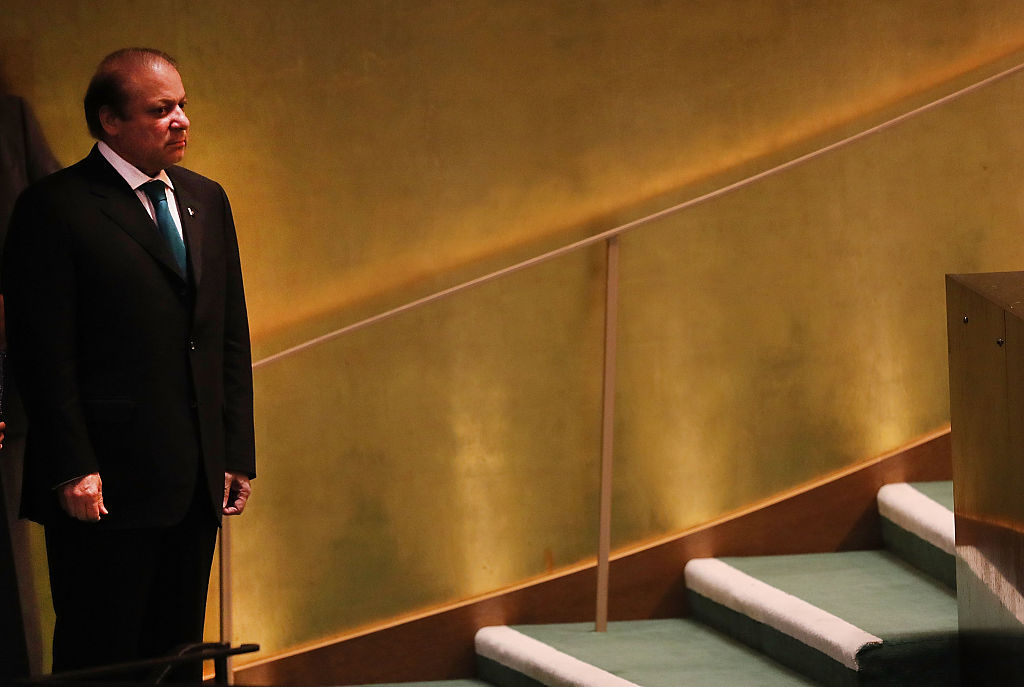By Mihir Sharma
In Pakistan’s 70 years of existence, not one prime minister has served a full five-year term. They’ve been fired by governor-generals and army chiefs and judges. So it was always fruitless, I expect, to hope that Nawaz Sharif, elected with a massive mandate in 2013, would become the first. And so it has proved: Sharif was “disqualified” — in fact, dismissed — by Pakistan’s Supreme Court on Friday. The last elected prime minister before Sharif, Yousuf Raza Gilani, was also dismissed by the Supreme Court, in 2012.
The headlines will tell you that Sharif was forced out amid accusations of corruption — and that’s true, as far as it goes. Unfortunately, it doesn’t go very far. In fact, it’s hard to escape the conclusion that Sharif was dismissed because, as with the others, a secretive military “establishment” decided to fire him. That’s bad news for Pakistan; again, a democratic mandate appears to have been shown to be of no account when compared to the wishes of the army. Nor is it good news for Pakistan’s neighbors — or the West.
The Supreme Court didn’t find Sharif guilty of corruption per se, but instead declared that he’d violated Articles 62 and 63 of Pakistan’s Constitution, which demand that members of parliament be “sadiq” and “ameen” — “truthful” and “righteous.” These were made into requirements by one of Pakistan’s many past military dictators, presumably as a way of controlling legislators.
The conditions are usually used as a way to humiliate and harass candidates; this is the first time they’ve been used to disqualify a member of parliament retrospectively. It doesn’t take a genius to see Sharif is being singled out using a particularly dangerous and illiberal constitutional clause.
Of course, Sharif’s no saint. He welcomed the judicial dismissal of his predecessor, and a court-appointed “joint investigation team” amassed a 275-page report on his family’s affairs that makes for quite fascinating reading. But it’s worth noting that the weighty accusations against Sharif date back not just to before he was prime minister, but in some cases to the 1980s. The court pushed the burden of proof onto Sharif, not the team it appointed; even so, the dossier was assembled suspiciously quickly, in just three months. The fact that the supposedly independent investigation team included two members of the Pakistan military’s powerful intelligence services may have had something to do with it. It would be a brave Pakistani bureaucrat indeed who did not sign off on facts provided by a man in uniform.
It wouldn’t be surprising if the army wanted Sharif out. They’ve never enjoyed easy relations — the last time Sharif was prime minister, he was deposed in an military coup — but things really went downhill when someone leaked details of a meeting in which Sharif’s brother had a “verbal confrontation” with the powerful head of Pakistani intelligence over the army’s support to militants.
The Pakistani government set up a committee to investigate the leak. But once the committee finished, and the prime minister issued an official notification that he was satisfied with its report, the army’s spokesman declared on Twitter: “The notification is rejected.”
I suppose it’s a bit of an advance that, unlike in 1999, this confrontation hasn’t led to a coup. Instead the judicial system has been used and the army has restricted itself to effectively supporting the opposition leader, Imran Khan. Khan poses as a democrat but has famously claimed that Pakistanis would celebrate and “distribute sweets” if the army took over again.
Sharif’s defeat and the triumph of Khan and his backers in the military is, seen this way, not good news for anyone. It’s bad for Pakistan, where democracy seems constantly to struggle to take root; and it’s bad for India, where many trusted the business-friendly and pragmatic Sharif would manage to outwit the army, take greater control of the country’s foreign policy and become a reliable partner for peace.
When Sharif was elected, you could hope that, under him, Pakistan would grow closer to India and the west, crack down on terrorism, and reform its economy. You can no longer expect any of that. Instead, it’s far more likely Pakistan will turn to China to help shore up its patronage-based economy.
Just look at the numbers: Pakistan ran an unprecedented current account deficit last year, driven by a big jump in imports — attributed by the State Bank of Pakistan to the cost of machinery and material associated with China’s infrastructure projects in Pakistan. How is that being paid for? By record borrowing, especially from China, which loaned Pakistan $3.9 billion last year alone. And many of these Chinese-backed projects are being carried out by military organizations, which will entrench themselves further at the center of Pakistan’s economy.
No, Nawaz Sharif is no saint. But his departure is very bad news for anyone who had bet on a brighter future for Pakistan.



























